Categories: "Food"
Салат
If there is any word in the Russian language that a modern American is bound to misunderstand, that word is салат. For an American the primary meaning of salad is a mixture of raw leafy greens with a bit of dressing on top, perhaps with tomatoes or some other vegetables added. In Russia the leafy greens are not a requirement at all. If you mix a quantity of any vegetable matter with some kind of herbed sauce and serve it up on a plate, that is салат. For instаnce, a hundred grams of potatoes combined with enough mayonnaise to cover them, that is салат. If you combine a hundred grams of cucumber with enough sour cream to cover the slices and enough dill to make the sour cream green, that is салат.
Among the most well-known Russian salads are:
| Name | Ingredients |
| Салат «Оливье» | boiled potatoes hard-boiled eggs boiled sausage marinated cucumbers peas |
| Винегрет | boiled beets boiled potatoes boiled carrots sunflower oil |
| Мимоза | canned fish onions eggs mayonnaise |
| Салат из крабовых палочек | artifical crab hard-boilded eggs onion canned corn mayonnaise |
For a marvelous rant inspired by Мимоза, see Tanyant. For those of us who are vegetable-impaired, there is a valuable website called Мир салатов The World of Salads.
Салат can also mean lettuce, and thus it can also mean any salad made with lettuce as well. But what Russian ever uses lettuce?
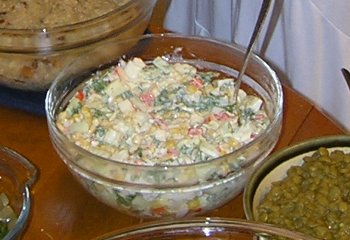
Салат из крабовых палочек
Artificial crab salad
Маракуйя
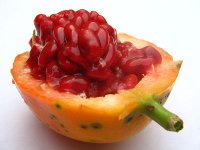
Back in the Soviet era there wasn't much tropical fruit in Russia. You couldn't find a banana to save your soul. Now bananas in Russian are as common as smog. Imagine my surprise, then, when a former student of mine wrote from Moscow that she had bought canned passion fruit and yogurt with passion fruit. Wow, everything has changed in Russia since communism fell. I hate it when that happens.
The Russian word for passion fruit is маракуйя, a word most likely borrowed from Spanish. (There are also some other phrases that describe it, namely, страстоцвет съедобный, пассифлора съедобная, and гранадилла пурпурная; маракуйя seems now to be the standard.) Words ending in -йя are uncommon in Russian, so one immediately is curious what the genitive plural is. It turns out to be маракуй.
Some sample sentences:
| Я лично не верю, что в йогурт с маракуйей кладут маракуйю. Это всё продукты химической промышленности. | Personally, I don't believe that they put passionfruit in passionfruit yogurt. It's all just products of the chemical industry. |
| Если вы устали от хмурого неба, просто скушайте маракуйю! (source) | If you are tired of the gloomy weather, just eat a passionfruit! |
| Для этого суфле нужно двести пятьдесят милилитров нектара маракуйи. | For this soufflé you need 250 mililiters of passionfruit nectar. |
| Сперва Зина мне не понравилась, а потом она меня ударила по голове маракуйей, и с тех пор я её ужасно люблю. | At first I didn't like Zina, but then she hit me in the head with a passionfruit, and since that time I have loved her like crazy. |
| es | maracuyá |
| fr | fruit de la Passion |
| ge | Pasjonsfrukt |
| pt | maracujá |
Суп
The Russian word for soup is суп. It is an end-stressed noun in the plural, but stem-stressed in the singular, which means it declines like this:
| Singular | Plural | |
| Nom | суп | супы |
| Acc | суп | супы |
| Gen | супа | супов |
| Pre | супе | супах |
| Dat | супу | супам |
| Ins | супом | супами |
The Russians love soup, and frankly the best soups I've ever had in my life have been in Russia. That's because the Russians aren't worried about things like heart disease and cardiac plaques: there's plenty of fat or butter in every soup. And soup is an essential part of обед. If you try to serve a Russian обед and there's no soup involved, you can be darn sure they think you are stinting on your hospitality. The most famous Russian soups are a beet soup called борщ (see Olga's entry about it) and a cabbage soup called щи.
Although for classroom purposes we say that Russian has six cases, in fact it has quite a few more. Some nouns distinguish a locative case that is separate from the prepositional case, and суп is one of them. That is, sometimes instead of «в супе» you may encounter «в супу» with the meaning “in the soup.” The locative case is slowly dying out in Russian, merging with the prepositional. «В супе» is much more common these days than «в супу».
You may also encounter a partitive case form супу, which means “some soup” as in «Хочешь супу?» “Do you want some soup?” or «На завтра хозяин сварил грибного супу из шампиньонов» “For tomorrow the host has made some mushroom soup from champignons.” The partitive case is also dying in Russian, merging with the genitive case. Mostly you will find the plain genitive case in such contexts nowadays.
Sample sentences:
| Кто там плавает в супе? | What is that floating in my soup?¹ |
| Мама делает суп из сушёных грибов. | Mom makes soup from dried mushrooms. |
| Девушки, подскажите, как варить мясо для супа? | Ladies, could you please tell me how to boil meat for soup? |
| Алёна Винницкая покорила мужа гречневым супом. (source) | Alyona Vinnitskaya won her husband over with buckwheat soup. |
¹ Кто in Russian applies to animals as well as people, so the sentence means “What kind of critter is floating in my soup?”
Икра, часть вторая
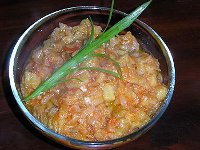
Just because a can has the word икра on it does not necessarily mean that it contains caviar. If you chop vegetables finely, season them and mix them with some oil until they make a paste that resembles pressed caviar in texture, that is called икра, in which context it's probably best to translate it as pâté. One of the most common is баклажанная икра eggplant pâté (recipe), which is as ubiquitous in Russian families as California Dip is in American families. Кабачковая икра squash pâté is also common. I've even had грибная икра mushroom pâté in restaurants.
Икра, часть первая
The word икра has several meanings in Russian. The first one that comes to mind is caviar, which means fish eggs. Russians love caviar. In the US it's a rare family that buys caviar, but in Russia it's very common to buy caviar for parties. It's considered a treat and a way of showing your guests that you are a host that will go all out for them. It is either put in a bowl from which the guests serve themselves with a small spoon, or it is set upon pieces of bread with butter.
| The most common type of caviar to buy is красная икра red caviar. Sometimes red caviar consists of light orange eggs, each of which is a bit bigger than the plastic head of a sewing pin. | 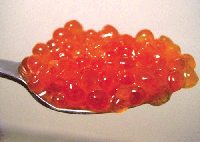 |
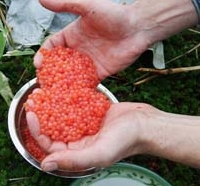 |
Sometimes it is larger salmon eggs that resemble the “Balls o' Fire” bait used in the US for fishing. |
| Sometimes it is чёрная икра black caviar, which is small gray-black sturgeon eggs and is the most expensive kind. | 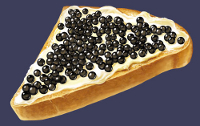 |
A quick look on the web shows that you can easily pay over a hundred dollars an ounce for caviar, and I've even seen it priced at nearly two hundred dollars an ounce:
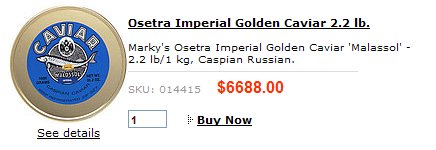
What could be odder than paying $200 for a tiny mass of fish eggs? Why, smearing it on your face for cosmetic effect, of course:
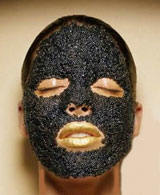
When my fellow blogger Таня saw this picture, she said, “I just want to lick that caviar off her face!” Thanks a million, Таня. That's an image I won't be able to get out of my mind for weeks.
Here are a few sample sentences:
| Блины с красной икрой – национальное русское блюдо. (source) | Blintzes with red caviar are a Russian ethnic dish. |
| Я люблю чёрную икру больше, чем красную. | I like black caviar more than red. |
| Миланские полицейские приняли решение раздать малоимущим горожанам 40 килограммов белужьей икры, изъятой в прошлом месяце у двух контрабандистов. (source) | Milanese police have decided to distribute to needy citizens forty kilos of beluga caviar that was confiscated last month from two smugglers. |
Wow, those Italians… feeding caviar to the poor. I'm moving to Milan.
<< 1 ... 7 8 9 ...10 ...11 12 13 ...14 ...15 16 17 ... 21 >>